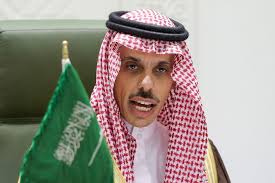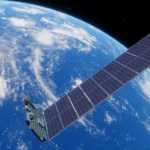
In the heart of Saudi Arabia, in Riyadh, Hisham was walking enjoying the mild winter weather when he was surprised by the police. The reason? The print on his t-shirt with the word “Palestine” written in six different fonts.
“Why are you using this? This is a political gesture. We are pro-Palestine, but you can’t do that,” the officials warned. Hisham, a government employee, agreed to remove his shirt and leave the premises.
Like many Saudis, Hisham feels deep solidarity with the Palestinian victims of Israel’s five-month offensive in Gaza – the reason for his choice of t-shirt. But the police response underscores the alarm emanating from the Saudi leadership, which before the war was close to an agreement to normalize relations with Israel.
Now, Saudi Arabia’s leaders are concerned about the threat posed by a prolonged conflict in Gaza to their chances of restarting that process, as well as to their ambitious plans for economic and social reform and the kingdom’s cohesion.
Saudi officials have repeatedly called for an end to the war and led Arab nations in accusing Israel of committing war crimes in Gaza. They fear the brutal images emerging from the devastated territory could radicalize their young population.
“The international community cannot remain silent while the people of Gaza are displaced and suffering the ugliest forms of human rights violations,” Foreign Minister Prince Faisal bin Farhan said at a Human Rights Council meeting in UN headquarters in Geneva in February.
Despite public outrage spreading across the kingdom, the United States is pushing Saudi Arabia to normalize diplomatic relations with Israel as the main incentive to persuade the Jewish state into a broader agreement to end its protracted conflict with the Palestinians.
Saudi Arabia has always been considered the big prize for Israel. As the Arab world’s largest economy and home to Islam’s two holiest sites, a decision by the kingdom to normalize relations with the Jewish state would have far-reaching effects.
However, even with such possibilities, many Saudis still feel afraid to express their true feelings about the war for fear that their opinions could be seen as opposition to official policy.
In the recent past, the Israeli-Palestinian issue seemed to have been left aside in Saudi Arabia. However, with the offensive in Gaza, the Palestinian cause returned to the spotlight, hampering Saudi Arabia’s ability to “sell” a normalization agreement with Israel to its citizens and to the Arab and Islamic world.
Hisham, the government official, reflects this tension. While he understands the sensitivity around foreign embassies that led to his approach by police, he is surprised by the contrast with neighboring countries he has visited since the start of the war. He has seen Palestinian flags and symbols openly on display on visits to the United Arab Emirates, Egypt and Turkey, amid a wave of support that has intensified across the Arab and Muslim world since the invasion.
“I saw in Dubai that some art galleries are focusing on Palestine. It’s a small gesture, but you can understand the meaning,” Hisham said. Such an act of solidarity “isn’t even possible here, and I really don’t understand it. It’s a little thing you can do, and people would appreciate it.”
Fonte: Financial Times
Source: https://www.ocafezinho.com/2024/04/02/para-agradar-os-eua-e-israel-arabia-saudita-proibe-manifestacoes-pro-palestina/

